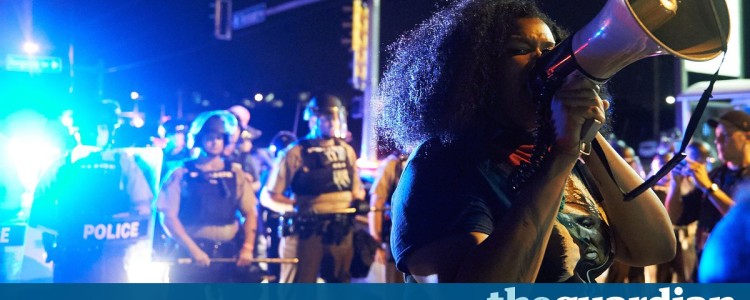ACLU revealed Tuesday that Facebook, Twitter and Instagram gave special access to Geofeedia, a controversial social media monitoring company

Facebook, Twitter and Instagram have previously provided users data to a software company that aids police surveillance programs and targets protesters of color, according to government records obtained by the American Civil Liberties Union.
The ACLU revealed on Tuesday that the technology corporations gave special access to Geofeedia, a controversial social media monitoring company that partners with law enforcement and has marketed its services as a tool to track Black Lives Matter activists.
In response to the findings, all three companies have announced measures to cut off Geofeedias access to certain data streams, even though critics say the corporations need to adopt broader policies that prevent this kind of surveillance and data sharing.
The ACLUs past records requests in California have determined that at least 13 police agencies have used or acquired Geofeedia, a Chicago-based startup that has worked with law enforcement across the US. Emails between the company and police revealed that Geofeedia had developer-level access to Twitter, Facebook and Instagram, which means it could review streams of user content in ways that regular members of the public cannot, according to the ACLU.
The fact that third parties are making big money off of the sale and trading of our data with law enforcement is a huge problem and one that any social media user in this country or beyond should be disgusted and surprised by, said Malkia Cyril, executive director of the Center for Media Justice, which has urged companies to end their relationships with Geofeedia. It clearly has a chilling effect on democratic protests.
Instagram had provided Geofeedia access to Instagrams API, or application programming interface, which is a feed of data from users public posts that includes their location, ACLU said. The photo-sharing service terminated access to the API last month, ACLU said.
The ACLU said Facebook allowed Geofeedia to use its Topic Feed API, a tool geared toward media companies and brands that enabled Geofeedia to obtain a ranked feed of public posts centered around specific hashtags, events or places. Facebook also ended this access last month.
Twitter provided Geofeedia with searchable access to its database of public tweets. In one email obtained by the ACLU, a Geofeedia representative told police it had a feature that covered Ferguson/Mike Brown nationally with great success, a reference to the Black Lives Matter protests against police brutality in Missouri.
Shortly after the release of the report on Tuesday, Twitter said it was immediately suspending Geofeedias commercial access to its data.
Policy (@policy)Based on information in the @ACLUs report, we are immediately suspending @Geofeedias commercial access to Twitter data.
The revelations have further exposed hypocrisy in Silicon Valley where tech leaders have expressed praise for Black Lives Matter, yet appear to be helping a social media monitoring company that targets protests and aids police.
The companies have made strong public statements about supporting political and social movements, including Black Lives Matter, said Nicole Ozer, technology and civil liberties policy director for the ACLU of California. Now they need to make sure their systems are living up to their commitments.
Cyril said the case highlighted the need for tech companies to actively protect users against the kind of surveillance that has disproportionately targeted communities of color.
Cutting ties with Geofeedia is an excellent first step, but the next step is making clear, transparent, accountable policies policies that the public understands about what your relationship is to the police and how and when they will use this user data.
Ozer added: The ACLU shouldnt have to do a public records act request to tell Facebook and Twitter what their developers are doing.
The ACLU previously found that Geofeedias marketing materials have referred to unions and activists as overt threats and that the company told police its product can help track the Ferguson situation. One California police department allegedly used the software to monitor South Asian, Muslim and Sikh protesters, the ACLU said.
A spokesperson for Facebook, which owns Instagram, told the Guardian in a statement that Geofeedia only had access to data that people chose to make public, adding, If a developer uses our APIs in a way that has not been authorized, we will take swift action to stop them and we will end our relationship altogether if necessary.
A Twitter spokesperson noted that the company prohibits the sale of user data for surveillance and has a developer policy that bans the use of its data to to investigate, track or surveil Twitter users.
Geofeedia CEO Phil Harris did not address the specific allegations in a statement on Tuesday, but said the company is committed to the principles of personal privacy and has clear policies and guidelines to prevent the inappropriate use of our software.
That said, we understand, given the ever-changing nature of digital technology, that we must continue to work to build on these critical protections of civil rights, he added.








